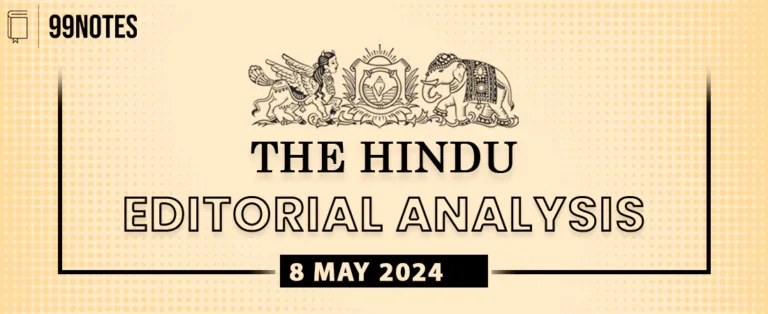22 June 2023 : The Hindu Editorial
The Hindu Editorial
22-June-2023
Daily Current Affairs For UPSC ,The Hindu Editorial Summary
1. Heat and state: on a heatwave being only one half of the issue.
Topic: GS3 – climate change.
Context:
-
-
-
Ballia district in Uttar Pradesh reported the highest number of deaths during the recent heatwave in the region.
-
-
More about the news:
-
-
-
The interplay of factors such as infrastructure, social security, contaminated water, and inadequate cooling facilities can contribute to the deadliness of heatwaves.
-
Literacy and access to resources are crucial in combating the impacts of heatwaves.
-
Amenities like drinking water, indoor ventilation, healthcare, work breaks, and wage loss protection can help mitigate the effects of extreme heat.
-
It is essential to accurately register and assign the cause of heat-related deaths through medical certificates and compile and release data on these deaths for research and policy purposes.
-
The Office of the Registrar General should release annual reports on heat-related deaths to prevent disputes and facilitate informed decision-making.
-
-
Recent data about heat waves in India:
-
-
-
In April 2023, India experienced its hottest April in recent times, with average maximum temperatures reaching 35.6 degrees Celsius.
-
The number of heatwaves in India has increased by 100% since the 1960s.
-
The intensity of heatwaves in India has also increased, with temperatures rising by an average of 0.5 degrees Celsius per decade.
-
-
Reasons for increasing instances of heat waves:
-
-
-
Climate Change: The primary driver behind the intensification and frequency of heatwaves is climate change. Rising global temperatures due to greenhouse gas emissions trap heat in the atmosphere, leading to more frequent and severe heatwaves.
-
Urbanization: Urban areas tend to experience higher temperatures compared to rural areas due to the urban heat island effect. The concentration of concrete, asphalt, and buildings absorbs and retains heat, exacerbating the intensity of heatwaves in cities.
-
Deforestation and Land Use Changes: Destruction of forests and changes in land use patterns contribute to heatwave formation. Forests provide shade, evaporative cooling, and help maintain local climate conditions. Deforestation reduces these cooling effects, leading to higher temperatures.
-
Atmospheric Conditions: Specific atmospheric patterns can contribute to the development of heatwaves. High-pressure systems and stagnant air masses can trap hot air and prevent the dissipation of heat, leading to prolonged periods of extreme heat.
-
Natural Variability: Natural climate variability, such as El Niño and La Niña events, can influence temperature patterns and contribute to the occurrence of heatwaves. These climate phenomena can enhance or suppress heatwave conditions depending on regional and global effects.
-
Human Activities: Human activities, such as industrial processes and emission of pollutants, energy consumption, and transportation, release greenhouse gases that contribute to global warming and increase the likelihood of heatwaves. Urban heat island effects are also exacerbated by human-made structures and infrastructure.
-
-
Ways to combat Heat wave situations:
-
-
-
Public Awareness and Education: Raising awareness about heatwave risks and educating the public on preventive measures can help people better understand the dangers and take necessary precautions during extreme heat events.
-
Heat Early Warning Systems: Implementing effective heat early warning systems can provide timely information to individuals, communities, and authorities about impending heatwaves. This allows for better preparation and response to mitigate the impact on vulnerable populations.
-
Urban Planning and Design: Urban areas can incorporate heat-resilient urban planning and design strategies. These may include increasing green spaces, promoting tree cover, using reflective or cool materials for buildings and pavements, and improving natural ventilation to reduce the urban heat island effect.
-
Cool Roofs and Green Roofs: Using cool roofs, which have reflective surfaces to reduce heat absorption, can help lower indoor temperatures and reduce energy consumption. Green roofs, with vegetation cover, provide insulation and help regulate temperatures in buildings.
-
Adequate Ventilation and Cooling: Ensuring access to adequate ventilation and cooling systems in homes, schools, workplaces, and public spaces can help individuals cope with extreme heat.
-
Emergency Response and Healthcare: Strengthening emergency response systems and healthcare services to manage and treat heat-related illnesses is crucial. This includes training healthcare professionals, ensuring the availability of medical supplies, and establishing protocols for the treatment of heat-related conditions.
-
Climate Change Mitigation: Addressing the root cause of heatwaves by reducing greenhouse gas emissions and taking steps towards climate change mitigation is vital. This involves transitioning to clean and renewable energy sources, promoting energy efficiency, and adopting sustainable practices in various sectors.
-
-
2. Spare a thought for psychiatric caregivers too
Topic: GS3 – Mental health.
Context:
-
-
-
Approximately 6%-7% of India’s population suffers from mental disorders.
-
The COVID-19 pandemic has worsened the situation by increasing stress levels across social segments.
-
-
Issues related to mental health caretakers:
-
-
-
Caregivers of psychiatric patients experience significant stress, including physical and emotional caregiving, social isolation, financial difficulties, and troublesome patient behavior.
-
Women caregivers face additional challenges in balancing caregiving with other responsibilities.
-
Mental illnesses are often excluded from medical insurance coverage, limiting access to affordable services.
-
Prolonged caregiving negatively impacts caregivers’ psychological well-being.
-
Lack of trained specialists and insufficient budget allocation for mental health pose challenges for implementing cost-effective intervention models.
-
A structured intervention program is needed to educate and support caregivers, providing them with a better understanding of the illness and their roles.
-
Successful intervention models include cognitive behavioral therapy, psychoeducational skill building, family counseling, and peer support.
-
-
Reasons for increasing mental illness:
-
-
-
Increased awareness and diagnosis: In the past, mental illness was often stigmatized and not talked about. However, in recent years, there has been a growing awareness of mental illness, and more people are seeking help for their mental health problems. This has led to an increase in the number of people who are diagnosed with mental illness.
-
Changes in society: The world is becoming increasingly complex and fast-paced, which can put a lot of stress on people. This can lead to mental health problems such as anxiety and depression. Additionally, social media and other forms of technology can also contribute to mental health problems, as they can lead to feelings of isolation and disconnection.
-
Life experiences: Traumatic life experiences, such as abuse, neglect, or violence, can also increase your risk of developing a mental illness.
-
Substance abuse: Substance abuse can also lead to mental health problems. If you are abusing drugs or alcohol, it is important to seek help for your substance abuse problem, as it can make your mental health problems worse.
-
Social and cultural factors: Social factors, including discrimination, stigma, and social exclusion, can negatively affect mental health. Cultural expectations, gender roles, and societal norms may also contribute to the development of mental health issues.
-
Economic factors: Socioeconomic disparities and poverty can increase the risk of mental illness. Limited access to quality healthcare, education, employment opportunities, and social support systems can have a detrimental impact on mental well-being.
-
-
3. Overkill: On the Internet shutdown in Manipur.
Topic: GS3 – Internet Access.
Context:
-
-
-
The Manipur High Court granted limited Internet access in designated places in the State.
-
The Internet shutdown in Manipur has been going on for over a month and a half, and it is having a negative impact on the economy and the people’s ability to communicate.
-
-
Situation in Manipur:
-
-
-
The Manipur government argued that the shutdowns were necessary to block websites with inflammatory material.
-
The situation in Manipur could be effectively addressed by restoring stakeholder confidence, engaging civil society actors, isolating extremists, and pursuing a step-by-step approach towards peace and normalcy.
-
The continuation of the Internet shutdown, which has been in place for over a month and a half, is not justified given the circumstances and must come to an end.
-
-
Supreme Court verdict on internet shutdowns:
-
-
-
The Supreme Court, in the case of Anuradha Bhasin vs Union of India (2020), held that indefinite suspension of Internet services contravenes the law and violates fundamental rights.
-
-
Implications with internet shutdowns:
-
-
-
Freedom of speech and expression: Internet shutdowns curtail the right to freedom of speech and expression, limiting the flow of information and impeding individuals’ ability to express their opinions and engage in online discussions.
-
Access to information: Internet shutdowns restrict access to vital information, including news, educational resources, healthcare information, and government services. This can hinder people’s ability to make informed decisions.
-
Economic impact: Internet shutdowns disrupt economic activities, particularly online businesses, e-commerce, and digital services. It affects entrepreneurs, freelancers, and workers who rely on the internet for their livelihoods, leading to financial losses and unemployment.
-
Social and cultural isolation: Lack of internet connectivity cuts people off from social media platforms, communication apps, and online communities. This isolation can adversely affect social connections, exacerbating feelings of loneliness and disconnection.
-
Education and learning: Internet shutdowns disrupt online education platforms, e-learning initiatives, and access to educational resources. Students are unable to participate in online classes or access educational materials, leading to educational setbacks and inequalities.
-
Human rights and activism: Internet shutdowns hinder the ability of human rights activists, journalists, and civil society organizations to communicate, document abuses, and advocate for social justice.
-
Emergency services and public safety: Internet shutdowns can impede access to emergency services, disrupt communication between emergency responders, and hinder dissemination of critical information during times of crisis or natural disasters.
-
Trust and confidence: Repeated internet shutdowns erode public trust in the government and its commitment to upholding fundamental rights and freedoms. It can create a climate of fear and uncertainty among the population.
-
-
For Enquiry

22 June 2023 : The Hindu Editorial

22 June 2023 : Daily Current Affairs

21 June 2023 : Indian Express

21 June 2023 : PIB

21 June 2023 : The Hindu Editorial

21 June 2023 : Daily Current Affairs

20 June 2023 : Indian Express

20 June 2023 : Daily Quiz

20 June 2023 : PIB

20 June 2023 : The Hindu Editorial
The Hindu 22 June 2023 : The Hindu Editorial The Hindu Editorial
22-June-2023
Daily Current Affairs For UPSC ,The Hindu Editorial Summary
Facebook-f
Twitter
Youtube…
Daily Current Affairs 22 June 2023 : Daily Current Affairs DAILY CURRENT AFFAIRS
22-June-2023
Daily Current Affairs For UPSC ,Daily Current affairs of The hIndu…
Indian Express 21 June 2023 : Indian Express Indian Express
21-June-2023
The Indian Express, CSE candidates can stay informed about current events…
PIB 21 June 2023 : PIB PRESS INFORMATION BUREAU
21-June-2023
Daily Current Affairs For UPSC ,The PIB ( Press Information Bureau…
The Hindu 21 June 2023 : The Hindu Editorial The Hindu Editorial
21-June-2023
Daily Current Affairs For UPSC ,The Hindu Editorial Summary
Facebook-f
Twitter
Youtube…
Daily Current Affairs 21 June 2023 : Daily Current Affairs DAILY CURRENT AFFAIRS
21-June-2023
Daily Current Affairs For UPSC ,Daily Current affairs of The hIndu…
Indian Express 20 June 2023 : Indian Express Indian Express
20-June-2023
The Indian Express, CSE candidates can stay informed about current events…
Daily Quiz 20 June 2023 : Daily Quiz 20 June 2023 : Daily Quiz…
PIB 20 June 2023 : PIB PRESS INFORMATION BUREAU
20-June-2023
Daily Current Affairs For UPSC ,The PIB ( Press Information Bureau…
The Hindu 20 June 2023 : The Hindu Editorial The Hindu Editorial
20-June-2023
Daily Current Affairs For UPSC ,The Hindu Editorial Summary
Facebook-f
Twitter
Youtube…



